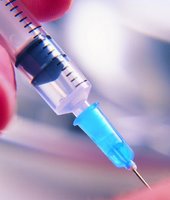
Let's set the facts straight: First, the testing. During the TdF, the riders who win the day's stage as well as the overall leader are subject to blood and urine tests within half an hour of the finish of each day's race. This means Landis would've been tested after stages 11, 12, 15-17, 19, 20. Four other competitors selected at random are tested each day as well.
Okay, so Landis gets his blood and urine tested seven times. Six of the seven times, nothing abnormal shows up on the first test or "A" test. Although cycling's governing body, the Union Cycliste International (UCI), does not require positive A tests to be confirmed by a second "B" test, standard laboratory protocol would assume this is necessary to offset any potential testing errors. (Does this say something already about the UCI?)
What Landis' post-stage 17 A test revealed was an "elevated" ratio of testosterone to epitestosterone. Normal people have a T:E ratio of between 1:1 and 2:1. Above 4:1 is considered abnormal, although some people do naturally have ratios in this range. A naturally occurring hormone (a biological "messenger"), testosterone stimulates muscle growth following strenuous efforts. Normally, an athlete would have to use testosterone supplements over a long period of time during training, with recovery afterwards, to reap the benefits. A quick shot of it following stage 16 would've been largely pointless and provided no tangible results one day later. The only evidence to the contrary is that Landis looked downright pissed off at the people crowding around him when he got off his bike after stage 17--a case of 'roid rage, perhaps? And even if, as some erroneously claim, that Landis was drinking tons of water during stage 17 to dilute his blood, doing so only decreases absolute concentrations, not relative concentrations (as concerning the T:E ratio).
The UCI is partners in crime with the World Anti-Doping Administration (WADA). Now it's true that various forms of performance-enhancing doping were rampant within professional cycling and cross-country skiing, and I applaud the UCI's crackdown on it since the "Festina scandal" in 1998. But the UCI has gone so far off the deep end that they've demolished athlete's careers on the basis of mere speculation (case in point: the team Astana riders who were prevented from starting this year's Tour, even though they never conducted any blood tests and were later acquitted). Even at the slighest whisper of fraud, the UCI slaps racing bans of up to four years. This has unduly tarnished cycling's reputation, causing many sponsors to pull out. For example, the Spanish Comunidad Valenciana team has lost its sponsorship post-Tour, and now the struggling athletes are left jobless. This happens all the time.
I find it interesting that TdF runner-up Oscar Pereiro, upon being told he would become the champion of Landis is stripped of his title, said that he doesn't want the title--a mere "academic" championship, he said. With all he has going for him, Pereiro doesn't even trust the UCI's testing!
If tests can prove unquestionably that Landis cheated, then by all means he ought to face the consequences. But the UCI, WADA, and--most of all--the American media need to give athletes the benefit of the doubt and live by the "innocent until proven guilty beyond reasonable doubt" rule. After all, isn't due process part of the Bill of Rights by which we live or die?
No comments:
Post a Comment